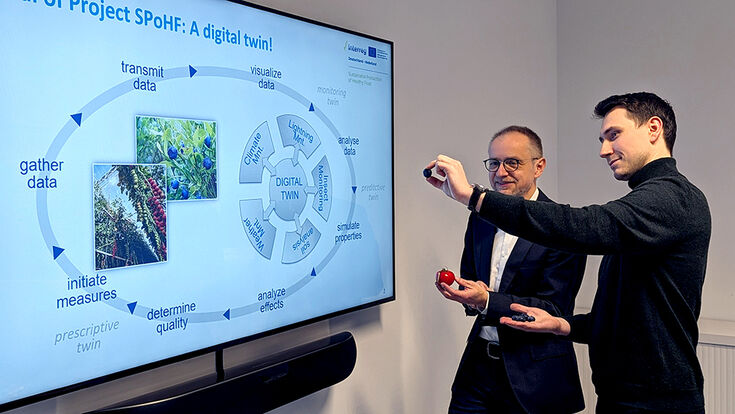How can food be produced more sustainably right from the start? How can growers save energy and resources? And can the quality and health value of fruit and vegetables be maintained or even specifically improved? The Hochschule Niederrhein (HSNR) is working on the answer - and is creating digital twins of real plants.
Digitalization is becoming increasingly important, especially in the agricultural and food sector in times of rising energy costs. The "Sustainable Production of Healthy Food (SPoHF)" funding project is being launched with nine partners to promote this change in the border region between Germany and the Netherlands. On the HSNR side, the research team includes researchers from the GEMIT institute and the Faculty of Food and Nutrition Sciences.
The joint project combines artificial intelligence, sensor technology and laboratory analysis to create digital models of plants. The Interreg VI A program Germany-Nederland is providing 2.36 million euros in funding for the project. The HSNR, as the project leader, will receive a share of 741,000 euros.
What exactly is happening? SPoHF focuses on fruit and vegetable cultivation both in the open field and in greenhouses. The project partners are looking at the direct environmental factors of tomatoes and blueberries: How do lighting, temperature, soil quality, irrigation and natural plant protection need to be adjusted to optimize the growth and quality of the plant and fruit while using less energy?
The project partners are developing and testing their own smart software and hardware solutions for each environmental factor. Additional sensor technology in the immediate vicinity of the plants is intended to improve humidity and heat temperature. A smart lighting system will also adjust the light intensity in the greenhouse depending on the weather. The more precise use of weather data, adapted pest control and monitoring of soil quality also play a role in the research. As a result, optimum plant growth is achieved with less energy input.
These process changes are accompanied by analytical studies in the laboratory and on the plants in the field to determine whether and how the quality and health-relevant content of the fruit changes as a result.
The research team at the Institute of Business Process Management and IT (GEMIT) is creating virtual plant twins based on the process and product data. These are intended to make it easier to monitor the condition of the real, physical plants with the help of artificial intelligence. Project manager Professor Dr. André Schekelmann and academic staff Rebecca Ries and Maximilian Hummel simulate the effects of changing environmental factors. Their influence on the plant can thus be read much faster than in real time and suitable measures can be suggested.
In order to develop continuous process monitoring methods, the Faculty of Food and Nutrition Sciences is also testing the use of innovative methods that allow plants and fruit to be analyzed non-destructively directly on site.
"SPoHF thus takes economic, ecological and health aspects into account: By using resources more effectively, cultivation operations should be able to work more economically. At the same time, the reduced use of fertilizers and pesticides for pest control should protect the environment. Finally, high-quality fruit will contribute to a healthier diet," says project manager Dr. André Schekelmann, Professor of Business Informatics.
The SPoHF project is being carried out as part of the Interreg VI A program Germany-Netherlands and is co-financed with 2.36 million euros by the European Union, the Ministry of Economic Affairs, Industry, Climate Protection and Energy (MWIKE) NRW, the Dutch Ministry of Economic Affairs (EZK) and the Province of Limburg.
All the facts at a glance:
Project name: Sustainable Production of Healthy Food
Project period: December 2023 to June 2027
Funding amount: 2.36 million euros co-financed by the European Union, the MWIKE NRW, the Dutch Ministry of Economic Affairs (EZK) and the Province of Limburg. Around 741,000 euros of this will go to HSNR
Partner: Institute GEMIT of The Hochschule Niederrhein (project management)
Faculty of Food and Nutrition Sciences of The Hochschule Niederrhein
Fontys University of Applied Sciences, Venlo
Brightlabs
Vitarom
Compas Agro
ProcEvolution
AppComm
Yookr
















